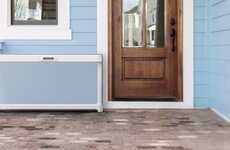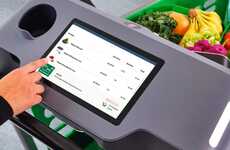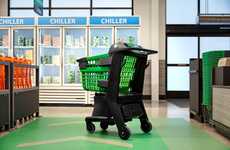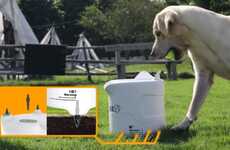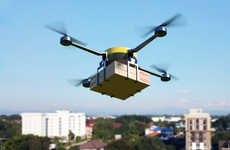
Target Fetch Uses Sensor Laden Homeware to Replenish Goods
Justin Lam — April 17, 2018 — Tech
References: thespoon.tech & cnet
Target Fetch is a new subscription service being tested by the discount retailer that will utilize Bluetooth-connected devices to track usage of household items and automatically order more. The service is currently geared to monitor supplies of toilet paper, paper towels and hand soap and will do so using a range of technological devices. Subscribers to the service will receive a toilet paper spindle, paper towel holder and soap pump, all of which are equipped with sensors, and can be connected to smartphones via the Target Fetch app.
The sensors built into each device will keep track of each item, and its use, and will use algorithms to learn about daily usage. Users will receive an alert 10 days before the app predicts they will run out of a certain product, and if users do not intervene it will order the necessary product from Target.com and ship it for free. Target Fetch is currently seeking beta testers and will be sourcing them through an Indiegogo campaign, and will cost an average of $40.
Image Credit: Target
The sensors built into each device will keep track of each item, and its use, and will use algorithms to learn about daily usage. Users will receive an alert 10 days before the app predicts they will run out of a certain product, and if users do not intervene it will order the necessary product from Target.com and ship it for free. Target Fetch is currently seeking beta testers and will be sourcing them through an Indiegogo campaign, and will cost an average of $40.
Image Credit: Target
Trend Themes
1. Automated Subscription Services - Companies can leverage technology to automate the delivery of household items, tracking usage and replenishing supplies with little to no customer effort.
2. Smart Home Technology Integration - Integration of IoT devices into homes, specifically for replenishing goods, has significant potential for growth and innovation in the home automation industry.
3. Predictive Analytics - By using data and algorithms to track usage and predict when supplies will run out, businesses can offer a more streamlined and efficient customer experience.
Industry Implications
1. Retail - Retailers can implement automated delivery systems to provide a more convenient way for customers to receive their commonly used household items.
2. Consumer Electronics - There is potential for manufacturers of various IoT devices such as sensors, Bluetooth-connected devices, and smartphones to integrate predictive analytics technology into their product offerings.
3. Logistics and Supply Chain - Advances in predictive analytics and automated delivery systems can significantly impact the way companies manage inventory and distribute products, potentially streamlining the supply chain process.
2.7
Score
Popularity
Activity
Freshness

